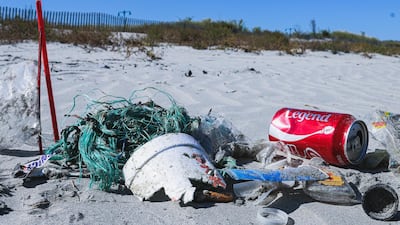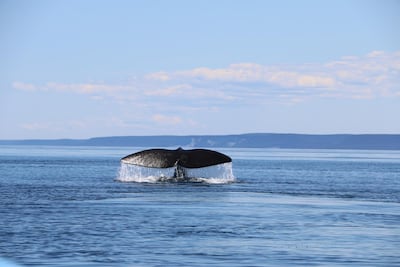A qualified diving instructor in her native Australia, Natalie Banks understands the delicate balance of sea life. She founded No Shark Cull to help protect sharks from wholesale destruction, then joined the non-profit marine conservation organisation Sea Shepherd, and became a spokeswoman for shark conservation. So, when she relocated to the UAE in 2016, she was already a devoted environmentalist and brought that passion with her.
'There is a misconception that the UAE is only desert'
“When my husband decided to take up a job in Dubai, I wanted to stay in marine conservation, and that meant I had to find a role here. But I didn’t get anywhere, so in frustration one day, I said to my mother: ‘I don’t know what to do.’ And she said: ‘Why don’t you do the same thing?’ And that’s how Azraq came about,” Banks explains.
Translating as "blue" from Arabic, the name pays homage to the UAE's historical link to the sea, while spreading awareness of the need to protect it, even for those who have never set foot on a boat. "There is a misconception that the UAE is only desert, but there is a lot of coastline," Banks says.
The reaction to Azraq has been nothing but positive, she explains. "We were welcomed with opened arms, particularly by the community, with people wanting to get involved with mangrove planting and beach clean-up days.
"We have been welcomed by corporate companies looking to do corporate social responsibility and, of course, we couldn't operate without the support of the government. For them to give us a permit to operate, they obviously saw something in Azraq of being of benefit to the UAE."
Oceans equal oxygen
A vast and intricately interlinked system covering more than 70 per cent of the planet, oceans play a vital role that is only just being understood. Between 50 per cent and 80 per cent of the world's oxygen comes not from trees, but from plankton, the tiny photosynthesising plants that fill the oceans.
According to the National Oceanic and Atmospheric Administration of America, one species in particular, Prochlorococcus, is not only the world's smallest photosynthesising organism, but also produces up to 20 per cent of all the oxygen in the atmosphere – more than all the tropical rainforests combined.
It is little wonder that Banks is compelled to preserve it, with education drives and regular beach and seabed clean-up events. "We try to make it more of a priority for people, but I have to admit, it is definitely a challenge. We are so reliant on our oceans for drinking water, and every second breath we take comes from our waterways."
While the team at Azraq can see the urgency of the issue of marine degradation, Banks realised that the most effective way to get people on board – particularly the naysayers – was to take a gentle approach.
"When I formed Azraq, I wanted to build networks and didn't want to go into a divisive topic straight away, which is why we started with marine debris. This has enabled us to get a foot inside many doors, because people cannot really criticise you for cleaning the beaches.
“I don’t see my role to shake trees and create disruption. I see my role as educating and raising awareness about things some people perhaps aren’t aware of.”

According the US non-profit organisation Plastic Ocean, an estimated 380 million tonnes of new plastic is made every year, with 50 per cent thought to be used for a few moments only before being discarded. The International Union for Conservation of Nature estimates that 8 million tonnes end up in the seas each year, adding to the five great rubbish patches – huge, floating slicks of man-made debris that stretch from the surface down to the ocean floor.
One effective way to combat this throwaway attitude is by reaching out to children, and Azraq has partnered with a number of schools. Most importantly, Banks has discovered that such interaction allows children to voice their concerns and make suggestions. "Children are so much more aware of the issue. We have brainstorming sessions and they come up with the most blue-sky ideas," Banks explains.
One such session resulted in the launch of Reef Rescue, to document the coral reefs that lie in UAE waters. “This is an initiative our youth ambassadors came up with. Aged between 10 and 18, they asked our team to do something about coral preservation, so we liaised with various reef entities, including John Birch of the New York University in Abu Dhabi, to understand the methodology, and get our people trained to do it properly.”
While the pandemic has curtailed many of the activities Arzaq was running, it has also prompted innovative approaches, such as the recently launched Socially Shy project, which allows companies to sponsor clean-ups remotely. The effect, Banks says, is a win for all concerned, especially the environment.
"The seabed in some places is just shocking. The biggest was Lulu Island in Abu Dhabi, where around 300 kilograms [of rubbish] was collected, the majority of which was single-use plastic bottles. You can imagine how light those bottles are, and how many bottles you'd need to make up the weight."
As well as consumer waste such as plastic bags and bottles, beaches face an insidious threat from plastic’s raw material: nurdles.
These pea-sized pellets are used to make every conceivable plastic product. “These are shipped around the world by container and truck, and being light, they are easily spilled,” she says.
“We find them at Saadiyat Island, which is a protected area for hawksbill turtles, and I go there and find sometimes tens of thousands of them. They are being found in the stomach of turtles because the turtles mistake them for fish eggs. And it is back-breaking work [to remove them], if you can imagine trying to find lentils in sand. And that’s just what’s on the surface.”
Despite tackling such a huge and ongoing problem, Banks remains upbeat.
"I do sometimes think, what are we doing to our natural environment and these beautiful animals that we are lucky to share this planet with? I have days when it feels utterly overwhelming. However, I'm optimistic and always return to the fact that I am doing the best that I can and that's all we can ask of anyone. If we can change one person, you never know what the impact of that will be. That's what gives me hope every day."
Azraq is also building strong links with local businesses, including The Good Chic, which offers sustainable menswear; Coega, which specialises in environmentally friendly swimwear; and Amanda X by M A R Y, which creates women’s clothes from natural fabrics.
Most recently, says Banks, Azraq announced a sponsorship deal with the Adnoc Group, as part of which the petrochemical company will pay for the planting of mangroves in an initiative called Mighty Mangroves. "Such collaborations validate what the last four years have been about, and ensure we are going in the right direction."




